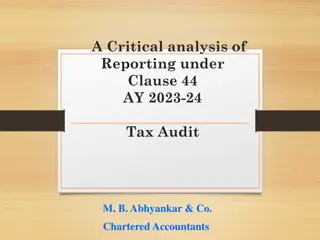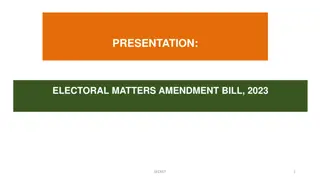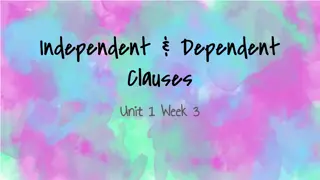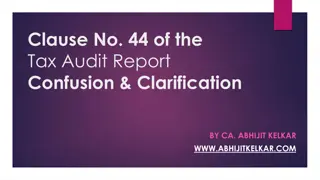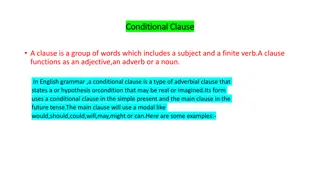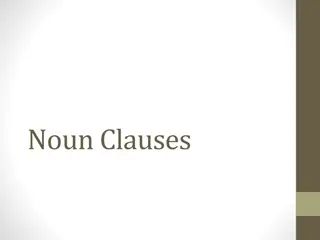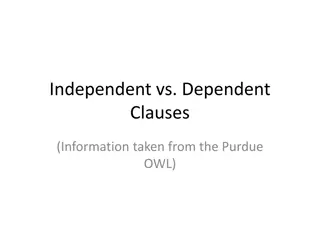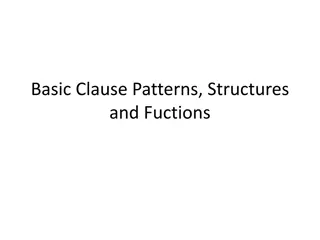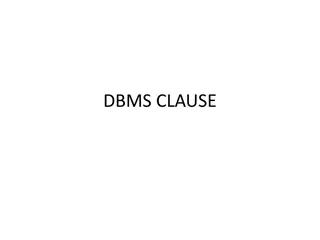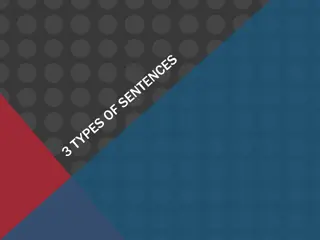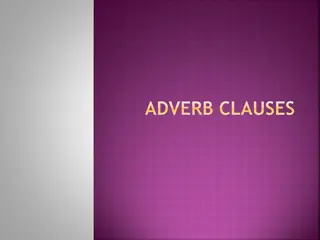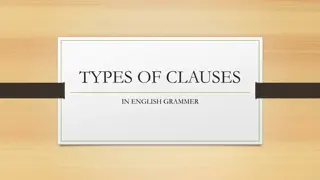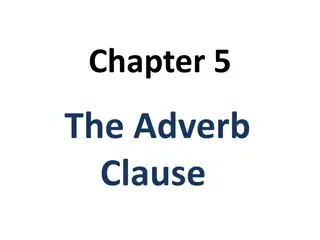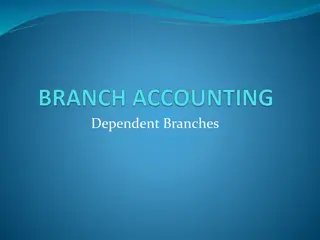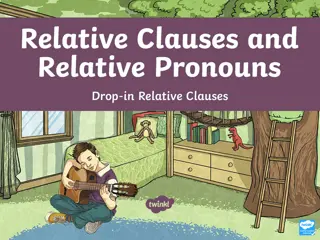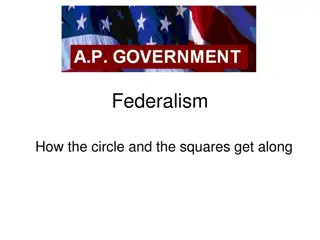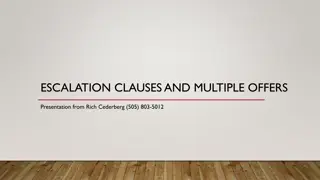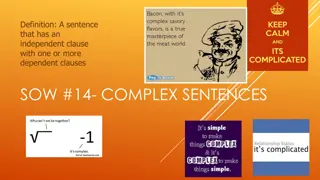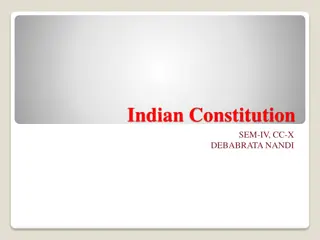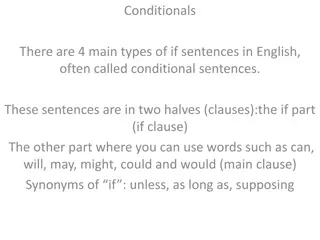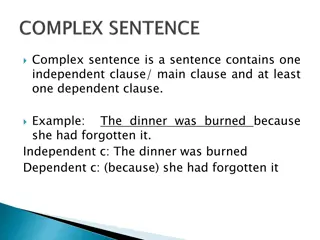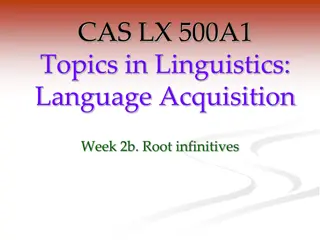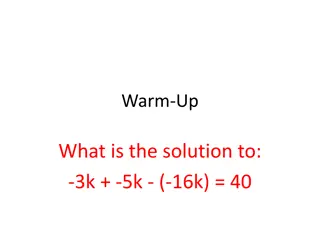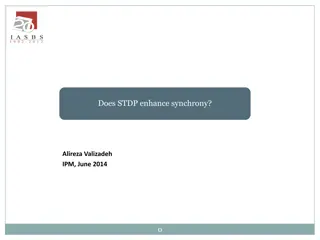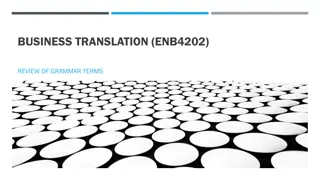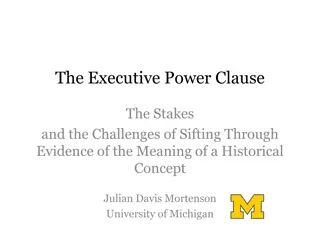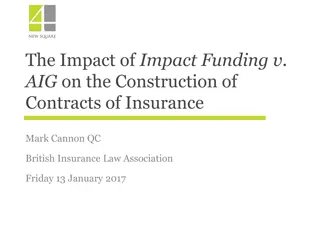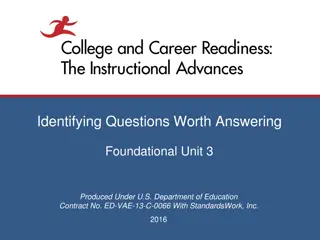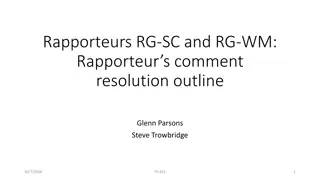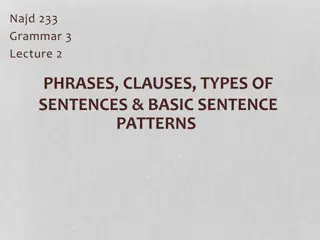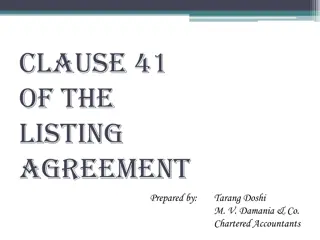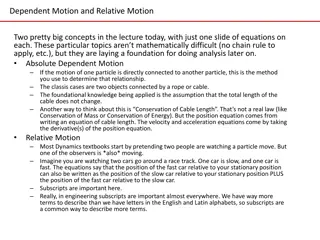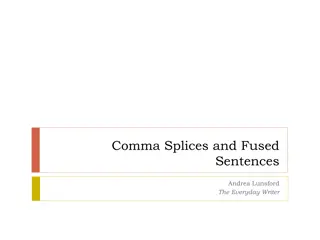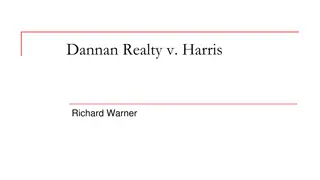Understanding the Need for Reporting Under Clause 44 in Tax Audit
Analysis of Clause 44 under Tax Audit, discussing modifications in Form 3CD, the optional reconciliation of expenses, challenges in database reconciliation, implications for assessees, and the importance of providing accurate information to align with GST regulations.
0 views • 10 slides
Progress Update on Electoral Matters Amendment Bill 2023
This presentation outlines the purpose, clause-by-clause analysis, constitutional court judgments, and recommendations concerning the Electoral Matters Amendment Bill 2023. It aims to inform the Joint Sitting of the Portfolio Committee on Home Affairs and the Select Committee on Justice about the de
0 views • 21 slides
Understanding Independent and Dependent Clauses
An independent clause contains a subject and a verb, forming a complete sentence on its own, while a dependent clause also has a subject and a verb but cannot stand alone. Dependent clauses rely on independent clauses to form complete sentences and are introduced by subordinating conjunctions. When
0 views • 4 slides
Understanding Clause 44 of Tax Audit Report with CA Abhijit Kelkar
In the Tax Audit Report under the Income Tax Act, Clause 44 has become mandatory from April 2022 onwards. This clause requires detailed reporting of various expenditure and payment details related to GST-registered entities. The provision was kept on hold till March 2022 due to the pandemic, but now
0 views • 25 slides
Understanding Conditional Clauses in English Grammar
A conditional clause is a type of adverbial clause in English grammar that states a hypothesis or condition using a conditional clause in the simple present and the main clause in the future tense. This type of clause uses modal verbs like would, should, could, will, may, might, or can. Conditional
2 views • 6 slides
Understanding Noun Clauses in English Grammar
A clause is a group of words with a subject and a verb, while a phrase lacks one. Independent clauses can stand alone, while dependent clauses cannot. Noun clauses function as nouns in a sentence, serving different roles like subjects, objects, prepositional objects, and complements. They can start
1 views • 49 slides
Understanding Independent vs. Dependent Clauses
Independent clauses express complete thoughts and can stand alone as sentences, while dependent clauses require an independent clause for support. Learn about coordinating conjunctions, comma splices, and run-on sentences to enhance your understanding of sentence structure. Avoid common errors by re
1 views • 10 slides
Understanding Basic Clause Patterns and Structures
Explore the core concepts of clause patterns, structures, and functions, including independent and dependent clauses, sentence types, compound sentences, and conjunction usage. Learn about the components of a clause, how to identify independent clauses, and how they can be linked to form compound se
2 views • 38 slides
Understanding WHERE Clause in DBMS
The WHERE clause in a database management system (DBMS) is used to fetch filtered data based on specific criteria or patterns. Operators such as >, >=, <, <=, =, <>, BETWEEN, LIKE, and IN can be used with the WHERE clause to define filtering conditions. This article explains the usage of WHERE claus
1 views • 24 slides
Understanding Types of Sentences in English Grammar
Simple, compound, and complex sentences are fundamental components of English grammar. Simple sentences express a single complete thought, compound sentences combine two independent clauses with a conjunction, and complex sentences consist of an independent clause and one or more dependent clauses.
2 views • 12 slides
Understanding Adverb Clauses: Usage and Examples
Adverb clauses help to establish relationships between ideas by indicating time, cause and effect, contrast, and condition. They are dependent clauses that must be connected to a main clause. Punctuation plays a key role in distinguishing between adverb clauses that precede or follow a main clause.
0 views • 43 slides
Understanding Noun Clauses and Their Functions
A clause is a group of words containing a subject and predicate forming part of a sentence. Noun clauses act as nouns in a sentence and can function in various ways, such as being the subject or object of a verb, participle, or preposition. They are identified by asking "who" or "what" questions and
0 views • 23 slides
Understanding Types of Clauses in English Grammar
A clause is a fundamental unit of a sentence, comprising a subject and predicate. Learning about the different types of clauses - Independent, Dependent, Relative, and Noun clauses - helps in enhancing grammar skills and sentence structure understanding. Independent clauses stand alone as complete s
2 views • 11 slides
Understanding Adverb Clauses: Types and Examples
Adverb clauses are dependent clauses that function as adverbs to modify the main clause's verb. They are connected by subordinating conjunctions and come in types like time, condition, cause, effect, and contrast. Adverb clauses of time detail when actions occur, while examples showcase how they mod
5 views • 7 slides
Understanding Dependent Branches in Business Operations
In any business undertaking, as the business expands, it often establishes branches to market products over a wider territory. Dependent branches rely on the head office for supply of goods and cash, and do not maintain separate accounts. This article explores the types of branches, features of depe
1 views • 5 slides
Understanding Relative Clauses and Pronouns
Utilize relative clauses to provide additional information to a noun, using relative pronouns such as who, which, where, when, and whose. Learn how to construct complex sentences with at least two clauses, ensuring the subordinate clause complements the main clause. Explore examples and practical st
2 views • 14 slides
Understanding Federalism in the United States
Federalism in the United States involves the relationship between the federal government and state governments, with terms such as delegated powers, reserved powers, concurrent powers, and the Elastic Clause playing key roles. The aftermath of events like Hurricane Katrina and policies such as No Ch
0 views • 30 slides
Analysis of Confrontation Clause in Recent Legal Cases
The analysis delves into the interpretation of the Confrontation Clause in legal cases such as State v. Mitchell and recent developments like the Bullcoming v. New Mexico case. The discussion revolves around testimonial statements, expert witness testimony reliability, and the requirement of actual
0 views • 29 slides
Understanding Grammar: Clauses in Sentences
A clause is a fundamental part of a sentence that comprises a subject and a verb. A clause can either stand alone as a sentence or be dependent on a main clause. Independent clauses can function independently, while dependent clauses rely on main clauses for context. Examples and explanations help c
0 views • 28 slides
Understanding Escalation Clauses in Real Estate
An escalation clause, also known as an escalator, allows a home buyer to increase their offer if a competing offer is higher. This presentation explains the components of an escalation clause, how it works in multiple offer situations, and provides sample language for incorporating it into a real es
0 views • 8 slides
Understanding Complex Sentences in English Grammar
Complex sentences consist of an independent clause along with one or more dependent clauses. The independent clause can stand alone, while the dependent clauses rely on the independent clause for meaning. Differentiating between independent and dependent clauses is essential in understanding how com
0 views • 15 slides
Evolution of the Indian Constitution: A Historic Journey
With 395 articles and 12 schedules, the Indian Constitution, effective since January 1950, is one of the world's longest. Framed over three years from December 1946 to December 1949, the Constituent Assembly painstakingly discussed and refined drafts clause by clause. The history of the Constitution
0 views • 16 slides
Understanding the 4 Main Types of Conditional Sentences in English
Conditional sentences in English consist of two parts: the "if" clause and the main clause. There are four main types of conditional sentences - Zero Conditional, First Conditional, Second Conditional, and Third Conditional. Each type is used to express different conditions and outcomes based on cer
1 views • 16 slides
Understanding Sentence Structure: Simple, Compound, and Complex Sentences
Explore the basics of sentence structure through simple sentences with one independent clause, compound sentences containing multiple independent clauses, sentence fragments, and complex sentences combining an independent clause with a dependent clause. Examples and guided practice included.
0 views • 22 slides
Understanding Complex Sentences and Clauses
Complex sentences consist of an independent clause and at least one dependent clause, such as adjective, adverb, or noun clauses. They are connected using subordinate conjunctions, relative pronouns, and relative adverbs. Each has a specific role in modifying nouns, pronouns, verbs, adverbs, or conn
0 views • 14 slides
Syntax in Language Acquisition: Root Infinitives and Small Clause Hypothesis
Children's syntactic development in language acquisition progresses from one-word utterances to combining words into basic sentences. This stage shows missing elements like tense, subject agreement, and auxiliary verbs. The Small Clause Hypothesis suggests that children initially lack certain struct
0 views • 52 slides
Understanding Independent and Dependent Variables in Algebra
Learn about independent and dependent variables in algebraic situations, equations, tables, and graphs. Discover the role of each variable, how they are classified, and their impact on functions. Practice identifying independent and dependent variables through examples and understand their significa
0 views • 55 slides
Understanding Types of Sentences in English Grammar
Types of sentences in English grammar include clauses - independent and dependent. Independent clauses stand alone, expressing complete thoughts, while dependent clauses rely on independent clauses. Different types of sentences include simple, compound, complex, and compound/complex sentences. Simpl
0 views • 41 slides
Exploring the Effects of Spike-Timing-Dependent Plasticity (STDP) on Synchrony in Neural Networks
This presentation delves into the impact of Spike-Timing-Dependent Plasticity (STDP) on synchrony within neural networks, examining how the structural effects of STDP enhance synchrony and influence network dynamics. Various forms of STDP, such as pair-based additive STDP and variations like nonline
0 views • 13 slides
Understanding Grammar Terms in Business Translation (ENB4202)
Explore key grammar terms such as action verb, adjective, adverb, article, clause, coordinating conjunction, dependent clause, gerund, linking verb, noun, noun phrase, object, phrase, preposition, pronoun, and subject in the context of business translation. Learn their definitions, functions, and ex
0 views • 14 slides
The Executive Power Clause: Exploring Historical Concepts and Legal Challenges
Delve into the complexities of interpreting the Executive Power Clause through historical evidence and the implications for presidential actions, including debates on legality in matters like detention and interrogation. Compare with the Legislative Power detailed in Art. I, emphasizing Congress's a
0 views • 15 slides
Impact of Impact Funding on Insurance Contracts Construction
Exploring the impact of impact funding versus AIG on the construction of insurance contracts, specifically focusing on the insuring clause, exclusion clauses, and the Court of Appeal decision regarding solicitors' professional indemnity insurance. The exclusion clause aims to distinguish personal ob
0 views • 24 slides
Enhancing Reading Comprehension Through Text-Dependent Questions
This resource delves into the significance of text-dependent questions in improving students' reading comprehension skills by emphasizing the importance of evidence from the text, building knowledge through nonfiction, and developing critical thinking abilities. It highlights key advances in educati
0 views • 16 slides
Draft Comment Resolution Process Summary
Editors have prepared revised drafts outlining the disposition of comments received. The proposal is to review documents by clause to address feedback and make necessary adjustments. An order of clause review has been established, with specific focus areas for different countries and sections. Ad ho
0 views • 4 slides
Understanding Phrases, Clauses, and Sentence Types in Grammar
A phrase is a group of words within a clause that conveys meaning, such as noun phrases, verb phrases, adjective phrases, adverbial phrases, and prepositional phrases. Clauses are groups of words containing a subject and a verb, with independent and dependent clauses being the two main types. Indepe
0 views • 33 slides
Understanding Clause 41 of Listing Agreement
Listing Agreement outlines the terms for securities to be traded on a stock exchange. Clause 41 mandates listed companies to provide detailed financial results periodically, promoting transparency for investors' informed decisions and safeguarding their interests. The results must adhere to accrual
0 views • 15 slides
Understanding Dependent and Relative Motion in Dynamics
Dependent Motion and Relative Motion are fundamental concepts in Dynamics, providing the foundation for future analysis. Dependent Motion involves constraints like ropes or cables, while Relative Motion considers observers in motion. Dynamics involves applying a limited set of equations in diverse w
0 views • 18 slides
Understanding Comma Splices and Fused Sentences
Andrea Lunsford's "The Everyday Writer" explains the errors of comma splices and fused sentences, offering various ways to repair them such as separating clauses, using coordinating conjunctions, semicolons, rewriting as an independent or dependent clause, or linking with a dash. This comprehensive
0 views • 8 slides
Understanding Complex Sentences: Clauses, Conjunctions, and Punctuation
A complex sentence comprises an independent clause that can stand alone and a dependent clause that relies on another clause. Learn about independent and dependent clauses, subordinating conjunctions, and proper punctuation with examples. Discover the role of relative pronouns in forming complex sen
0 views • 10 slides
Analysis of Entire Agreement Clause in Fraud Cases
The case of Dannan Realty v. Harris Richard Warner examines the impact of an entire agreement clause on a fraud cause of action. The majority opinion highlights that the specific language of the clause, stating the buyer is not relying on any representations outside the written contract, barred the
0 views • 6 slides
